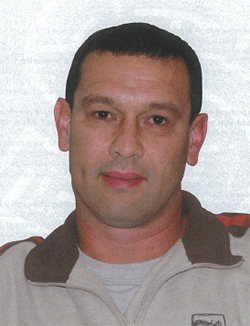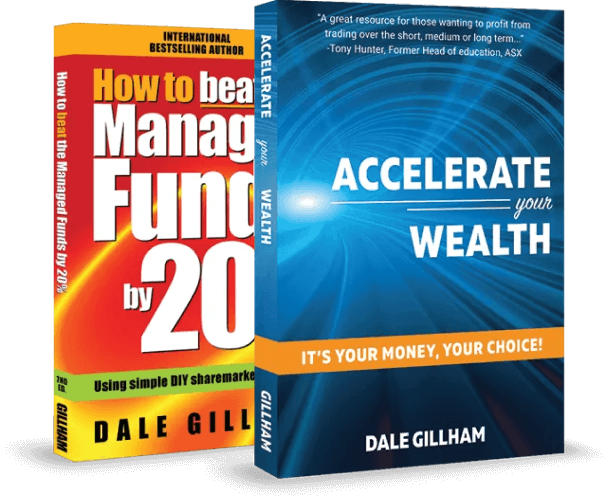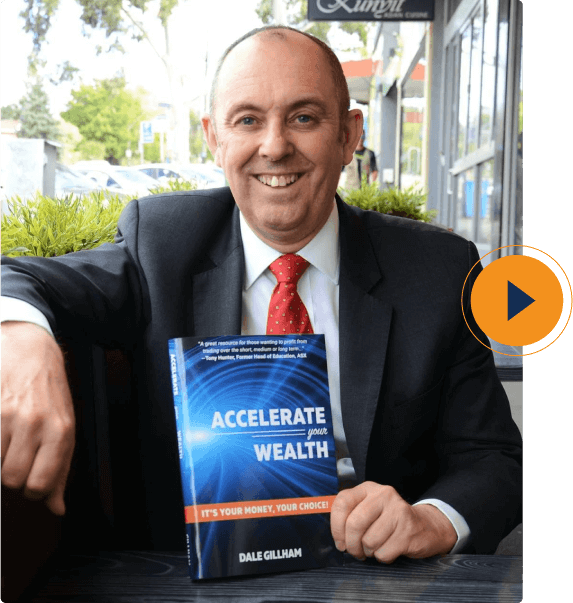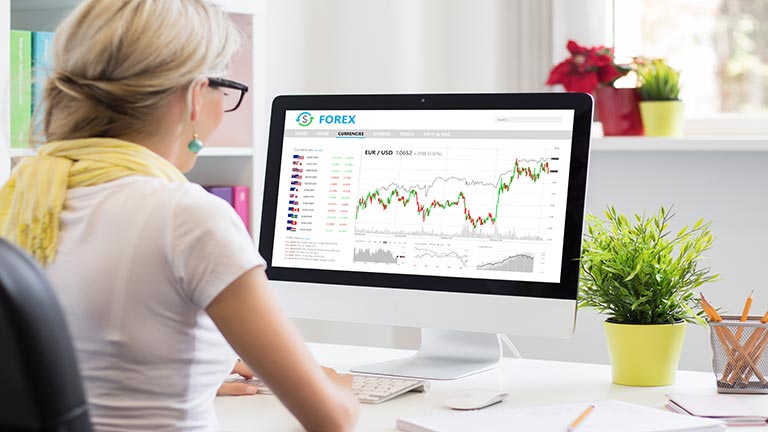Wealth Within Case Studies
Eric Grant
Eric Grant shares his review of Wealth Within. According to Eric, the future for me is being a full time trader because the thought of having even more choices and freedom certainly beckons and that is what I aim to achieve.
Originally from Fiji, Eric now lives in Sydney. Working shifts as a steel maker with OneSteel allows Eric the flexibility to pursue his goal of trading the stock market with a view to that becoming his full-time business in the near future. Eric enjoys playing chess, reading, rugby union, and hanging out with his family.

How and when did you first become interested in the markets?
Life presents us with many challenges. Sometimes it is not until we are challenged that we take a step back and look at our lives to evaluate what is important and what we need to do. My challenge, and when I became interested in the markets, was after hurting my back at work. I now have two bulging discs and the realization that I cannot work in the steel industry indefinitely. Many 45-year-olds in physically demanding jobs tend to look at the future and not be happy with what you see if you have no other plan than to keep doing what they have always done. I needed an alternative source of income to replace my wage, and following my injury I had the motivation to make it happen.
And then what happened?
I have learnt that just as life gives you the challenges it also gives you the answers if you look for them. In mid-2006 I was watching 'A Current Affair' on Channel 9 and saw a trader, John Gow, relating how he became a full-time trader. John's story was inspirational and struck a chord with me. When I started in the steel industry, OneSteel was still BHP - prior to this I spent six years in the Royal Australian Navy. John, like me, also worked for BHP and spent a lot of time out at sea, except he worked on oilrigs. John told how he gave up working and replaced his income through share trading. I have been lucky enough to meet John. He continues to be an inspiration to many who want to earn a living from trading, and he is continually helping others to believe they can achieve what he has achieved.
How have you been able to learn and educate yourself about the markets?
After watching 'A Current Affair' and learning about John Gow, I began to investigate stock- market courses. I was looking for a quality education, not some get- rich- quick- type seminar or workshop. After a lot of research, I decided that Wealth Within, where John had learnt to trade, was offering exactly what I was looking for, so I enrolled in their Diploma of Share Trading and Investment. I realize that my success depends on me, so I not only apply what I have learned but I also put continual effort into researching and back testing my trading, which teaches me a lot.
Did you make mistakes when first starting out?
Doesn't everyone? I made many mistakes when I first started out, even though I was being taught how not to make them. I was even told that I probably would make mistakes, but most learners we tend to not realize they are making a mistake until they have made it. Thankfully, the mistakes become learning experiences. This is where having mentors is important, because they can help you understand where you went wrong. When you start out trading, you know you can lose but you never really think you will. I think the more quickly you learn that mistakes are inevitable, the more quickly you will become a great trader.
Would you define yourself as a discretionary trader, a mechanical trader or a combination of both?
This is quite an interesting issue, because we are told in courses or in books to be mechanical in our approach. But we are also human, and this means we have choices or the ability to change our minds. I would say I am a combination of both, but at present, because of market conditions, I am leaning more towards a discretionary trader. In saying that, whilst my rules or strategy for each trade may vary, my approach to my trading is still quite mechanical. Mechanical trading tends to work well in strongly trending markets, but when you get a lot of volatility, as in the past year, I think you need to be far more flexible or discretionary in your approach.
Who have been some of your mentors and role models? What impact have these people made on you personally as well as your trading style?
With their enormous amount of real-world experience, the coaches and mentors at Wealth Within, especially Janine Cox and David, have been a great help. They knew where I have come from and appreciated what I wanted to achieve. They worked with me quite closely and were available when I needed them. Lea, the MD at Wealth Within, has always been encouraging and willing to share, with a genuine desire to help me become the trader I know I can be. Lea has helped me understand myself and this has allowed me to develop my own style as a trader rather than being a robot and following someone else's ideas. I think this is critical if you want to become an independent trader. I also found chatting to traders at the workshops, people who are actually trading for a living, boosted my confidence. Just in chatting with them, they transfer their belief that you can do it too and this motivates me to keep going.
Can you give us a brief overview of your trading style?
As I have already mentioned, my trading style is leaning more to discretionary trading. Currently I am trading CFDs short term, with my trades lasting two to three weeks. This not only suits my style and suits how I want to trade, but also suits current market conditions, which are very volatile. I use timing cycles to assist me in trading both long and short, and I combine these with the strong trading techniques of Gann, Dow, and Elliott among others. I tend to position trade rather than chase the market as I see many traders attempting to do, hence my two to three week trade time. This also suits the time I have available given my work schedule. When conditions settle I intend to return to more medium term trading. This is something I learned from the full time traders. They seem to have a medium term portfolio to build wealth and use short term trading simply for cash flow.
Is there any 1 trade (win or loss ) that sticks in your mind that had a profound impact or effect on your development as a trader? If so, what did you learn from this trade?
It wasn't one trade but a whole string of trades. I don't think you can really define trading in terms of one trade, as to do so can give you a distorted view of your ability. I started trading in January 2008, which in hindsight might not have been the best time given we were right in the middle of the GFC meltdown. Every single trade that I entered tanked and resulted in my being stopped out. After that, I stopped trading for about six months and did not even look at a chart. Even though I lost during this period, it did teach me the value of stop losses. More importantly, I learned to accept losses and that there are times when it is more beneficial to be watching than participating. The last point is quite important because some traders think that just because they are traders they have to be always trading. You need to trade only when you are in the right space and the market is conducive to trading.
Can you tell us about your best and worst trades?
The above would best describe my worst trades only because they were losses. My best trade to date would be where I went long on IPL (an ASX-listed stock) and made about 30 per cent profit. However, I think my best trade is yet to come. For me a good trade is about sticking to my plan and not whether I win or lose. This to me is the mechanical side of my trading.
Would you classify yourself as a short- term or long- term trader? What advice would you offer to people getting started as traders on the relative merits or otherwise of each?
I don't trade long term. Due to my time commitments, my overall strategy is more medium term. But market conditions right now are such that medium term trading is not very effective, so I am currently trading short term. My advice to people wanting to get started is that short term trading requires a lot of time, experience and skill. It is not the place to start but rather a place they can aspire to. Long term trading is the opposite - it does not require as much time or experience and is suitable for those starting out until they get the skill and experience to trade other, shorter time frames.
Long term, and, to some degree medium term trading are about capital appreciation or building wealth. Short term trading is about cash flow. I find those who are new to the market often get it backwards, thinking they will become rich trading short term. For those wanting to get started, I suggest that, like me, they back test their trading plan and paper trade for a while before implementing the plan. Doing this helps you build your skills and increases your confidence in yourself and your plan. As a shift worker, I do not have as much time as I would like to dedicate to short term trading. Given the time constraints, I short term trade only three stocks in the ASX top 20. Doing this fits within my time frame and gives me the results I am aiming to achieve at present.
What markets do you trade and which markets do you prefer ? Do you have a favourite, and why?
Again, given the time I have available I only trade blue chip stocks in the ASX top 100, because these take the least amount of work and deliver the most consistent returns. Taking on more markets or stocks right now would divert my focus and increase my workload, without necessarily giving me a better return. Short term trading requires you to have an intimate knowledge of what you are trading and because that is so, I tend to focus my attention on less rather than more. BHP is a great example. It is one of my favourite stocks to trade short term because it is so consistent. Because of that, I have been successful trading it.
What makes your trading style different from others? What sets you apart from other traders?
I don't think there is any one thing that sets me apart from other traders. We all have different styles and preferences. I think a major advantage that I have is that my mentors have taught me not only to recognise when the market is changing, but also to adapt to the different market conditions that arise. Being flexible in your approach to the market certainly gives you an edge over other traders who trade in only one way are inflexible or unable to move with the market.
Do you have a favourite trading rule?
Following on from what I said above means that I don't have a favourite rule, as I prefer to use a combination of rules. Whatever works best in my back testing and is suited to the current market conditions is what I will use to trade.
Ed Seykota says, "Everybody gets what they want from the markets". What does Eric Grant "get" from the markets?
That's simple - I get an enormous amount of satisfaction and fulfilment when my trading plan works. Trading is a journey, and trading well with a successful plan gives me the confidence knowing I am one step closer to my ultimate goal of being a successful full time trader.
How has trading affected your lifestyle?
Trading is allowing me to make choices that I could not make in the past, so I can reach my personal goals, not just monetary goals. Being able to make choices will have an even greater impact on my lifestyle as I progress in my journey. The more I trade and learn, the more my journey as a trader becomes real. One of my ambitions is to give up shift work so I can spend more time with my family and travel, and this is something I know I will achieve.
What books, seminars and courses have you read or attended and which would you recommend?
I have now completed the Diploma and Advanced Diploma of Share Trading and Investment with Wealth Within. I also attend their yearly workshops, where the team is passionate about helping me achieve success. This is an awesome experience that inspires me to continue my journey. I have read a number of books and would really recommend 'Trading in the Zone' by Mark Douglas.
What does the future hold for Eric Grant?
The future for me is being a full time trader. The thought of having even more choices and freedom certainly beckons and that is what I aim to achieve. One thing I have learned in my journey so far is that 'slow and steady' wins the race. I know that I am building a solid foundation of experience and skill that will eventually get me to my goal. I am also excited by the many different instruments to trade that I have not even looked at yet. The closer you get to your destination, the more you can see. I am a long way down the path from where I started my journey, and I am excited about where I can go and how trading can effect real change in my family's lifestyle.
Insights From Our Learning Centre


Learn the concepts as to how you can accelerate your wealth using simple DIY investment strategies that will enable you to take control of your investments. Dale Gillham, bestselling author, shows you how to invest with confidence to achieve very profitable returns.
Browse BooksOr Browse By Topic
5 Stars
Years in business delivering high-quality education
of students rate the quality of education as excellent or very good
of students recommend Wealth Within



